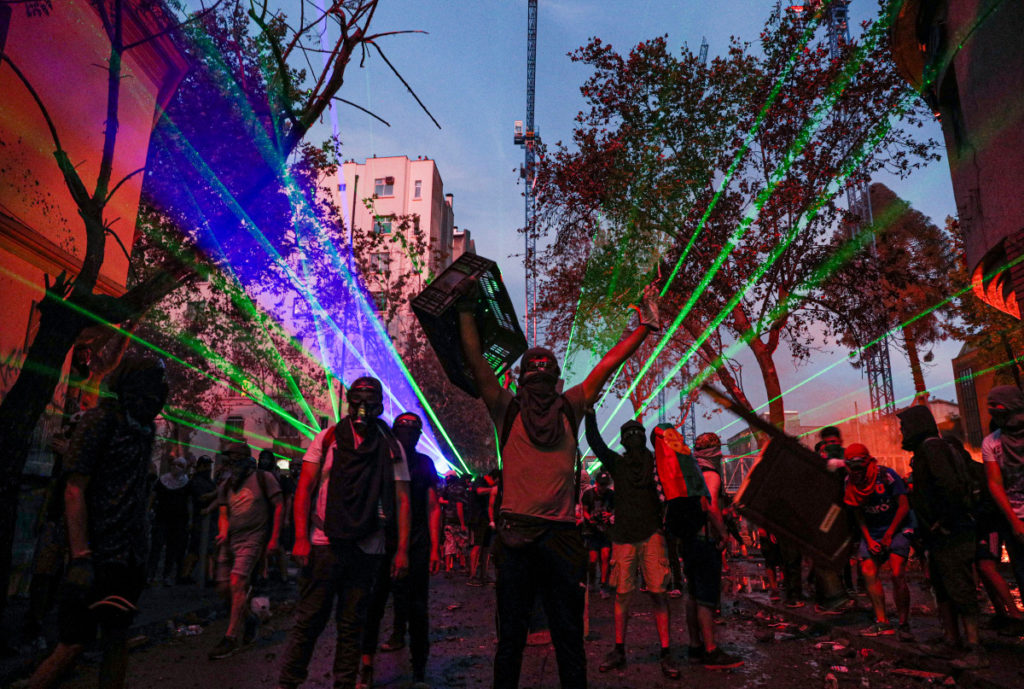The spasms of rage across the continent are felt here in Colombia, and today’s protests could snowball into something similar
Within the span of a few weeks, one government has been toppled, another was forced to flee the capital, and yet another was pushed to make concessions so deep they include plans to rewrite the country’s constitution.
The wave of protests sweeping across the continent, first in Ecuador, then in Chile and Bolivia (and also sporadically in Venezuela), has been called the “Latin Spring,” a variation of “Arab Spring,” the term given to the uprisings against Arab dictatorships a decade ago. But unlike those, the reasons for the unrest in the Latin American context are as diverse as the countries and cultures that make up the region.
There is, however, a common thread that links the wave of social unrest that stretches from Santiago to Caracas, and it’s that life has gotten tough, and it’s only getting tougher. Prospects for the future have dimmed. The cost of living goes up while wages stagnate, making it harder for people to make ends meet. There is a growing anger toward the economic inequality that apathetic governments here shrug at. And perhaps most of all, there is a feeling that their leaders have forgotten them; that politics is a game played by a privileged few who use it to consolidate power and enrich themselves.
Growing frustration about well being, financial or otherwise, is compounded by the fact that no one trusts their governments or its institutions. Nearly 80 percent of all Latin Americans believe, for example, that traditional political parties do not have their interests in mind.
The grievances that sparked spasms of rage against the ruling elite across the region are found in Colombia too, and today’s National Strike (Paro Nacional) could be the catalyst for the kind of prolonged violence, chaos, and paralysis that have characterized uprisings elsewhere.
Gov’t Misinformation Campaign
Colombian President Ivan Duque, his political godfather, Alvaro Uribe, and their right-wing Centro Democratico party are worried, and they should be. Many sectors of Colombian civil society have publicly stated they will be participating in the protests – including that institution that all right-wingers here uniformly support – the Catholic Church.
In its feeble attempt to blunt what is expected to be wide-spread participation in the National Strike, Duque and his allies embarked on a misinformation campaign that included spreading fake news, fabricated images and out-of-context videos all over social media. Doing what he does best, Uribe joined in the fear mongering and unsubstantiated conspiracy theories.
Ex-president and current Senator Alvaro Uribe talking about the “international anarchists” and other leftist conspiracies that he says seek to destabilize Colombia and the region. He provided no evidence to support his claims.
Duque also trotted out his finance minister, Alberto Carrasquilla, who claimed that the motivations for the National Strike were based on lies. “There are some sectors that are calling on people to march with falsehoods. At no time will the government reduce the minimum wage, nor will the retirement age increase, and there is no package to reduce the acquired rights of Colombians, ” he said on Tuesday.
That the Colombian finance minister accused others of spreading lies and misinformation is ironic given his track record. Carrasquilla has demonstrated publicly that he will flip-flop on issues when it serves his interests – even if it means creating uncertainty for investors. Earlier this year, the finance minister said the government would meet its 2020 budget goal by selling some state assets, and then turned around and said that “not a single cent” would come from the sales of state companies.
Carrasquilla has also been accused of “accounting shenanigans” by saying the government will include money from the future sale of public assets as revenues for this year. The latest budget trickery is part of a longer trend of self-contradiction by Carrasquilla, one that has damaged the credibility of his word to such an extent that the Fitch Ratings Agency downgraded Colombia’s outlook to Negative in May of this year.
Related: Welcome to Uribe 2.0
Still evidently panicked, the government stepped on the throttle, going from misinformation to repression, when police in Bogota raided the homes of more than two dozen student leaders, and even the office of the Cartel Urbano magazine. The reason? Police were ostensibly looking for weapons, explosive materials, and propaganda pamphlets.
It’s also possible that Duque is engaged in cyber warfare against critical media outlets. The editors at the Colombian online magazine La Oreja Roja (The Red Ear) think so, and with good reason. They, along with the websites Periodismo de Verdad and El Unicornio were blocked as of yesterday morning, they believe this is because of their support for today’s National Strike.
Perhaps coincidentally, all three media websites have the same hosting provider – Tigo Colombia.
Le pedimos respuestas a @Tigo_Colombia de por qué nuestro servidor no tiene conexión. #LaOrejaCensurada pic.twitter.com/NBNzDSGxlV
— La Oreja Roja (@LaOrejaRoja) November 20, 2019
The Colombian online magazine La Oreja Roja had its website blocked yesterday, and demanded an explanation from their hosting provider, Tigo Colombia.
How Will the Protests Play Out?
If Duque’s attempts to suppress dissent leading up to today’s protests were a dismal failure (a reoccurring theme with this administration), then he knows he can always fall back on a strategy used by authoritarian leaders everywhere – deploying the military.
This is not to say the government shouldn’t take the proper security measures, and have a police force at the ready to deal with hooded troublemakers and student radicals who like to play revolutionary (of which there are likely to be dozens). But sending hundreds of assault-rifle-carrying soldiers to patrol the streets of every major city shows that Duque is ready and willing to crack down hard on protesters, with the same forces that are usually reserved for fighting guerrillas and armed drug traffickers.
Naturally, the president denies that he has deployed battalions of troops and has militarized the cities. Denial, after all, is what he and his cabinet ministers do well, but people aren’t stupid, and nowadays everyone has a video camera in their pocket, so they can instantly show that the government is lying.
Public and private universities are being militarized in Colombia, 3 days before the people's national strike called for November 21st. Media is full of fake news, trying to criminalize the protests. The world must pay close attention to 🇨🇴.
— no mushrooms (@nosupermario) November 19, 2019
Video showing dozens of soldiers deployed on the streets of Bogota on November 18, three days before the National Strike was to begin.
By trying to prevent Colombia from plunging into the violence seen in Bolivia, Chile and Ecuador, Duque may be pushing the country head-long towards it. Those uprisings began in much the same fashion, initially with governments that denied the legitimacy of the protests and refused to back-track on their decisions. This head-strong position, and the violent clampdown on dissent that followed, didn’t end well for the leaders of those countries, and it might not end well should Duque decide to follow the same path.
It is difficult to make accurate predictions in the Land of Magical Realism. Whether or not today’s National Strike is a symbolic, one-off protest – or snowballs into a larger social movement – depends largely on how the president and his administration respond to it.
Imagine a scenario where a dozen or so protesters are killed by state forces. This might stir up a hornets nest, drawing larger and more angry crowds in the days following the National Strike. There will be no more talk of building bridges or uniting Colombians at that point. For angry Colombians who find themselves on the streets, the dilemma could become: do we accept any new concessions Duque decides to offer up, or do we bring he and his government down entirely?
That Colombia could be the latest domino to fall in the so-called “Latin Spring” doesn’t seem so outlandish. The conditions are there.

Journalist. Misfit. Malcontent. Provocateur. Is a better Colombia is possible? We’re starting to have doubts.

